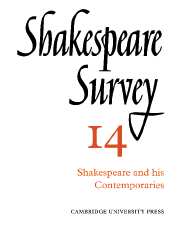Book contents
- Frontmatter
- Studies in Elizabethan and Jacobean Drama since 1900
- Shakespeare and Lyly
- Shakespeare and Mundy
- Marlowe as Provocative Agent in Shakespeare’s Early Plays
- The Tragedy of Revenge in Shakespeare and Webster
- The Simplicity of Thomas Heywood
- The Tragic Vision of Fulke Greville
- Shakespeare v. The Rest: The Old Controversy
- Shakespeare’s Gentleness
- Milton on Shakespeare
- An Unrecorded Elizabethan Performance of Titus Andronicus
- Stratford-upon-Avon a Hundred Years Ago
- International Notes
- Shakespeare Productions in the United Kingdom: 1959
- Three Directors: a Review of Recent Productions
- The Year's Contributions to Shakespearian Study 1 Critical Studies
- 2 Shakespeare’s Life, Times and Stage
- 3 Textual Studies
- Books Received
- Index
- Plate section
The Tragic Vision of Fulke Greville
Published online by Cambridge University Press: 28 March 2007
- Frontmatter
- Studies in Elizabethan and Jacobean Drama since 1900
- Shakespeare and Lyly
- Shakespeare and Mundy
- Marlowe as Provocative Agent in Shakespeare’s Early Plays
- The Tragedy of Revenge in Shakespeare and Webster
- The Simplicity of Thomas Heywood
- The Tragic Vision of Fulke Greville
- Shakespeare v. The Rest: The Old Controversy
- Shakespeare’s Gentleness
- Milton on Shakespeare
- An Unrecorded Elizabethan Performance of Titus Andronicus
- Stratford-upon-Avon a Hundred Years Ago
- International Notes
- Shakespeare Productions in the United Kingdom: 1959
- Three Directors: a Review of Recent Productions
- The Year's Contributions to Shakespearian Study 1 Critical Studies
- 2 Shakespeare’s Life, Times and Stage
- 3 Textual Studies
- Books Received
- Index
- Plate section
Summary
The outstanding feature of Fulke Greville’s writings—apart from their complexity—is the witness they bear to the sustained intensity of their author’s ‘cosmic vision’. In his ranging spirit of metaphysical inquiry and reference, Greville is the most Elizabethan of all the Elizabethans. That he was the worst dramatist of them all needs no urging. His poetic idiom is baffling. The speculative bent of his intellect swamped what dramatic instinct he may have had. And perhaps a characteristic dislike for what he termed ‘horrible periods of exorbitant passions’ had already precluded success in this field—though his Hala, Rossa, Alaham and Soliman are hardly to be described as passionless. Nevertheless, though his dramas are unactable, there is no denying their imaginative integrity, and their latent power.
In one important respect, Alaham and Mustapha are deserving of attention. The function of drama, with Greville, is to make apparent and explicit the forces that are operating in man and society, not to create the living characters and situations from which, among other Elizabethan authors, those forces are to be inferred. He was a playwright with the instinct of an essayist, concerned with the contemplation of human life rather than its portrayal, to 'trace out the high waies of ambitious Governours' rather than to enact 'the despair, or confusion of mortality' in the high-wrought passions of the contemporary tragedy. Thus he cannot write a play without making clear its significance in the light of his own opinions: and tragedy and tragic vision receive simultaneous dramatic expression, the latter principally in the Choruses, which are unique in the objectivity and completeness of the view of man's situation that they put forward. We therefore have in these two plays an unparalleled statement of that innermost understanding of life whence a tragedy derives its being.
- Type
- Chapter
- Information
- Shakespeare Survey , pp. 66 - 75Publisher: Cambridge University PressPrint publication year: 1961

